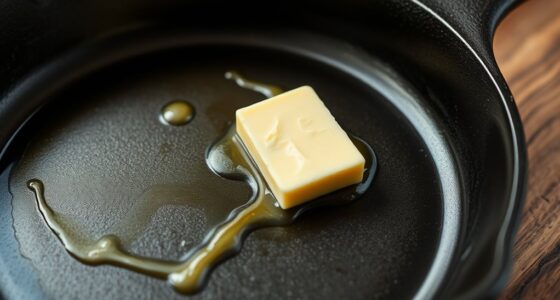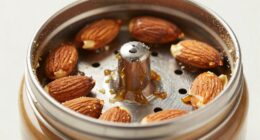You can quiet a squeaky hinge using butter, but it’s only a temporary fix. Butter provides a quick lubrication, reducing noise for a short time. However, it can attract dirt and may lead to rancidity, making things worse in the long run. For a more durable solution, consider alternatives like olive oil or commercial lubricants. If you want to keep your hinges functioning well, there are better methods out there to explore.
Key Takeaways
- Butter can temporarily quiet a squeaky hinge due to its fat content providing short-term lubrication.
- Applying butter is simple: just place a small amount directly on the hinge.
- While effective immediately, butter is not a long-term solution for hinge maintenance.
- The moisture in butter may lead to rancidity and attract dirt, worsening the issue over time.
- For better results, consider using olive oil, petroleum jelly, or specialized lubricants instead.

If you’ve ever been jolted awake by a squeaky door hinge in the middle of the night, you know how annoying it can be. That piercing sound can disrupt your peace and make you dread moving around your home. Many people search for effective solutions, and one popular suggestion is using butter. But is this a myth or a method that actually works? Let’s immerse ourselves.
First, it’s essential to understand the mechanics behind a squeaky hinge. When the lubricant in the hinge wears off, metal parts rub against each other, creating that dreadful noise. That’s where lubrication techniques come into play. While commercial lubricants are often the go-to solution, some swear by household remedies, butter being one of them.
Using butter might sound unconventional, but it can work in a pinch. The fat in butter can provide temporary lubrication, helping to reduce friction between the metal components. So, if you find yourself without a traditional lubricant, grabbing a stick of butter could be a quick fix. Simply apply a small amount directly to the hinge and move the door back and forth to work it in. You’ll likely hear the squeak diminish almost immediately.
However, you should be aware that while butter can work, it isn’t a long-term solution. Over time, the moisture in butter can lead to rancidity and even attract dirt and dust, which could worsen the squeak. If you want a more reliable method, consider other household remedies like olive oil or even petroleum jelly. These alternatives can provide better, longer-lasting lubrication without the mess that butter can leave behind. Additionally, using essential oils for various health benefits can also offer natural solutions for other household issues.
While you might appreciate the idea of using butter for a quick fix, you’ll want to follow up with a more effective lubrication technique soon after. If you’re committed to keeping those hinges quiet, investing in a proper lubricant can save you time and hassle in the long run. There are plenty of options available, from silicone spray to graphite powder, which are designed specifically for this purpose.
Frequently Asked Questions
Can I Use Margarine Instead of Butter for Squeaky Hinges?
Yes, you can use margarine instead of butter for squeaky hinges. While butter’s often recommended, margarine serves as a viable alternative in your kitchen hacks. Just apply a small amount to the hinge and work it in, allowing it to lubricate the joints. This DIY remedy can effectively reduce the noise and keep your doors functioning smoothly. Remember to wipe off any excess to prevent dirt buildup, ensuring long-lasting results.
How Long Does the Butter Last on the Hinge?
Butter on a hinge typically lasts a few weeks, depending on the conditions. Its effectiveness timeframe can vary; it might start losing its lubricating properties as it collects dust and dirt. If you notice the squeak returning, it’s time to reapply or consider a more long-lasting lubricant. For peak performance, store your hinges in a dry, cool place to extend the storage duration of the butter’s effectiveness. Regular maintenance helps keep things quiet!
Will Butter Attract Insects or Pests?
Butter’s like a magnet for insects, so yes, it can attract pests. When you use it on hinges, you’re inviting more than just silence; you’re potentially inviting ants, flies, and other critters. These pests are always on the lookout for a tasty treat, and butter’s a prime target. If you’re concerned about insect attraction, consider using alternatives like petroleum jelly or silicone spray that won’t create pest concerns in your home.
Are There Any Alternatives to Butter for Lubricating Hinges?
Yes, there are plenty of alternatives to butter for lubricating hinges. You can use DIY remedies like olive oil or coconut oil, which work well to reduce squeaks. Household items like petroleum jelly or even graphite powder can also do the trick. Just apply a small amount to the hinge and move it back and forth to distribute the lubricant. These options are effective and won’t attract pests like butter might!
Is It Safe to Use Butter on Outdoor Hinges?
No, it’s not safe to use butter on outdoor hinges. While it may initially work, butter can attract pests, leading to more garden maintenance issues. The fats in butter can spoil and create a sticky mess that draws insects. Instead, opt for a dedicated lubricant designed for outdoor use to guarantee smooth operation and pest prevention. Keeping your hinges well-maintained with the right product saves you time and hassle in the long run.
Conclusion
In summary, using butter to quiet a squeaky hinge is more than just a quirky myth; it’s a clever method that really works! Just a dab can transform that ear-piercing creak into a whisper, making your door sound as smooth as a whispering breeze on a summer night. Next time you’re faced with a squeaky hinge, grab some butter and give it a try—you’ll be amazed at how quickly it silences the noise!









